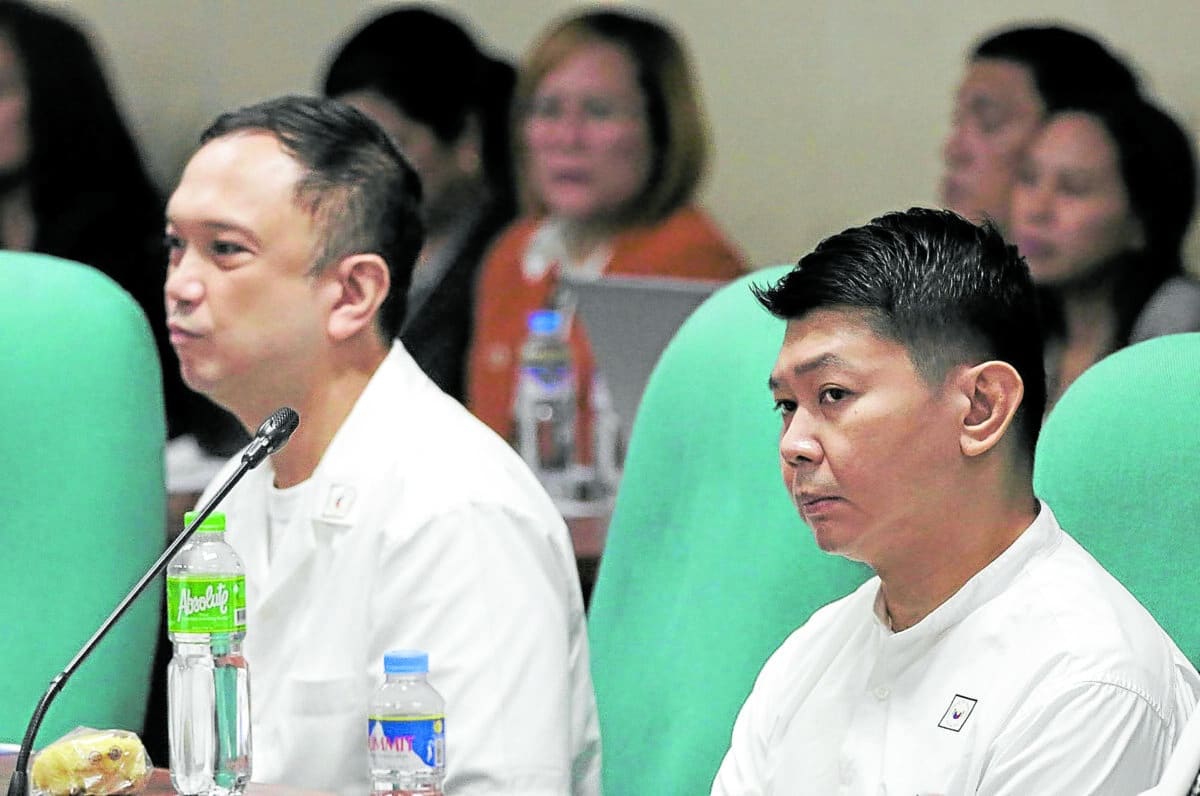
Richard Cruz (left) and Jojo Nones —Richard A. Reyes
MANILA, Philippines — The Department of Justice (DOJ) has filed criminal charges at the Pasay City Regional Trial Court (RTC) against independent entertainment contractors Jojo Nones and Richard Cruz for their alleged sexual abuse of actor Alessandro “Sandro” Muhlach.
According to the DOJ’s resolution, Nones and Cruz were charged with rape through sexual assault under Article 266-B of the Revised Penal Code, along with two counts of acts of lasciviousness under Article 336.
Rape is a nonbailable offense, punishable by 20 years to life imprisonment, while acts of lasciviousness carry a penalty of six months to six years of imprisonment.
READ: Sandro Muhlach on legal battle vs alleged abusers: We have more to reveal
Maggie Garduque, the lawyer for the respondents, said that they have yet to receive a copy of the DOJ resolution.
Force, intimidation
The 40-page document, which narrated in detail the alleged abuse that 23-year-old Muhlach experienced in a Pasay hotel on July 21 after the gala night of GMA Network, indicated that all elements of sexual assault were present in the case.
Muhlach submitted a complaint at the DOJ on Aug. 19, nearly a month after the incident, and the case was filed at the Pasay RTC last week, according to acting Prosecutor General Richard Fadullon.
In their assessment, state prosecutors found evidence of force and intimidation, noting that Muhlach’s affidavit clearly indicated that he repeatedly resisted and pleaded with the respondents to stop their unwanted sexual advances.
“Unfortunately, complainant Sandro was physically too weak and dizzy to succeed due to the effects of drugs and alcohol,” Senior Assistant State Prosecutor Susan Azarcon said in the resolution.
While the complainant may have appeared “normal” upon leaving the hotel room, prosecutors emphasized that this does not imply that Muhlach was not sexually abused.
Credibility
“Contrary to the claim of the respondents, Sandro made several attempts to leave the room and seek help but felt too weak to do so. Besides, the failure of the victim to shout for help or escape during the incident does not undermine their credibility,” they pointed out.
They added that the delay in reporting of the incident to authorities did not also affect the complainant’s credibility, noting that delays were not always viewed as signs of a false accusation.
“A rape charge becomes doubtful only when the delay in revealing its commission is unreasonable and unexplained,” they said, referencing a 2008 People of the Philippines vs Arturo Domingo rape case.
Muhlach initially refrained from disclosing the details of his sexual abuse to his father, veteran actor Niño Muhlach, as well as to authorities, due to fears of potential repercussions for his acting career, “which was just beginning to take off,” based on the resolution.
“Complainant Sandro had a hard time coming forward and reporting his sexual abuse for fear of suffering from the stigma of rape, wherein male victims are often blamed and chastised by the public,” the resolution added.
Weakest evidence
The document further noted that the respondents “acted in conspiracy in sexually abusing the complainant” by making him sniff a powder-like substance and drink wine before making sexual advances.
Speaking to reporters on Wednesday, Fadullon said that the panel of prosecutors considered the respondents’ defense but noted that they only denied the incident.
“We know in law that positive identification is the strongest form of evidence, while denial alone is the weakest. So, between the two, the prosecutor gave more weight and importance to the testimony and narration of the victim,” he said.
Fadullon noted that while there were alleged minor inconsistencies in the victim’s testimonies, these were “not enough to debunk or to say that what the boy is saying isn’t true.”
“Our law is clear. We used to think that rape only involved acts committed by a man against a woman. But because of amendments to the law, it now recognizes other forms of sexual abuse that aren’t necessarily committed by members of the opposite sex but can also be done by members of the same sex,” he said.
Fadullon emphasized that what the DOJ did was affirm the law, saying that they would continue to file appropriate cases if sufficient evidence exists, “regardless of the gender of those involved.”
“For all victims of sexual assault, for all victims of rape, we cannot live in fear. If we want to obtain justice for the wrongs done to us, we must have the courage to come forward, and the (DOJ) is ready to assist them,” he added.